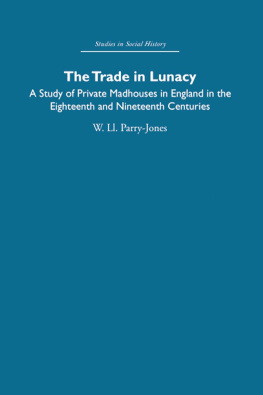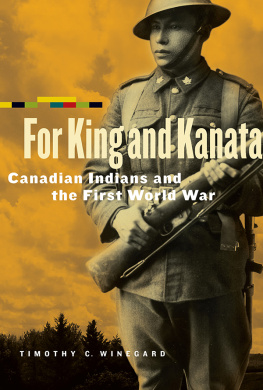
About this book
FRANCIS PEGAHMAGABOW was a remarkable aboriginal leader who served his nation in time of war and his people in time of peacefighting all the way. In wartime he volunteered to be a warrior. In peacetime he had no option. His life reveals how uncaring Canada was about those to whom this land had always been home.
A member of the Parry Island band (now Wasauksing First Nation) near Parry Sound, Ontario, Francis served with the Canadian Expeditionary Force in Belgium and France for almost the entire duration of the First World War, primarily as a scout and sniper. Through the horrific battles and inhuman conditions of trench warfare, his actions earned him three decorations for braverythe most ever received by a Canadian aboriginal soldier. More recently, they inspired the central fictional character in Joseph Boydens highly acclaimed novel Three Day Road.
Physically and emotionally scarred by his wartime ordeals, Francis returned to Parry Island to try to rebuild his life. He had been treated as an equal in the army, but quickly discovered things hadnt changed back in Canada. As a status Indian his life was regulated by the infamous Indian Act and by local Indian agents who seemed bent on thwarting his every effort to improve his lot.
So, Francis became a warrior once morethis time in the even longer battle to achieve the right of aboriginal Canadians to control their own destiny.
In compiling this account of Francis Pegahmagabows remarkable life, Adrian Hayes conducted extensive research in newspapers, archives, and military records, and spoke with members of Pegahmagabows family and others who remembered the plight and the perseverance of this warrior.
Originally published by Fox Meadow Creations, Pegahmagabow emerges again in this new Blue Butterfly Books edition, which incorporates additional material and updates some aspects of this unforgettable storyand the confusion that still surrounds it.
PegahmagabowPegahmagabow
LIFE-LONG WARRIOR
A DRIAN H AYES
Foreword by
H ON. J AMES B ARTLEMAN
Adrian Hayes
All rights reserved. No part of this publication may be copied, stored, transmitted or reproduced by any method or in any format without the written permission of the publisher or a valid licence from Access Copyright.
Blue Butterfly Books Publishing Inc.
2583 Lakeshore Boulevard West, Toronto, Ontario, Canada M8V 1G3
Tel 416-255-3930 Fax 416-252-8291 www.bluebutterflybooks.ca
Complete ordering information for Blue Butterfly titles is available at: www.bluebutterflybooks.ca/orders
Originally published in 2003 by Fox Meadow Creations
First Blue Butterfly edition, soft cover: 2009
Library and Archives Canada Cataloguing in Publication
Hayes, Adrian
Pegahmagabow : life-long warrior / Adrian Hayes ; foreword by
James Bartleman.
Includes bibliographical references and index.
ISBN 978-0-9784982-9-0
Electronic edition, ePub format: 2011
ISBN 978-1-9265773-0-2
1. Pegahmagabow, Francis, 18891952. 2. Canada. Canadian
Army. Canadian Expeditionary ForceBiography. 3. Indian
veteransCanadaBiography. 4. Indian activistsCanadaBiography.
5. Ojibwa IndiansOntarioParry Sound RegionBiography. I. Title.
E99.C6H38 2009 971.0049730092 C2009-900952-8
Design, typesetting and maps by Gary Long / Fox Meadow Creations
Blue Butterfly Books thanks book buyers for their support in the marketplace.
Dedicated to the memory of E. Roy Smith,
former Parry Sound mayor and MPP,
who first suggested to me that the deeds of
Francis Pegahmagabow should not remain forgotten
Part of the permanent display, Canadian War Museum, Ottawa, acknowledging the military exploits of Corporal Francis Pegahmagabow.
When James Bartleman became Ontarios first aboriginal lieutenant-governor, he knew only too well the conditions faced by Francis Pegahmagabow. His Honour used the full powers of his often-ceremonial position to achieve real results for First Nations children in isolated northern reserves and was asked by Premier Dalton McGuinty, in a rare event, to address the Ontario Legislature about this initiative. On his visits to these First Nation communities to oversee his program of distributing free books to youngsters in places lacking a library, he delighted, as captured in this photo, to engage and inspire children.
FOREWORD
Out from the Shadows
BY HON. JAMES BARTLEMAN
THE LIVES OF OTHERS can teach us a lot about our own.
In this story of a Canadian aboriginal, who out of patriotism was a warrior for his country in time of global war and then out of necessity became a warrior for his human rights in time of peace, we discover truths about ourselves, both individually and as a society collectively. The discoveries are not particularly comforting.
Adrian Hayes, author of this biography of Corporal Francis Pegahmagabow, first learned about the story of Canadas most-decorated First Peoples soldier when he was a reporter in his hometown of Parry Sound, writing a column on local history in the North Star. Parry Sound is near a reserve known today as the Wasauksing First Nation, on Parry Island, where Francis Pegahmagabow lived.
Although traditionally a nomadic people who moved west towards Georgian Bay in the spring to fish and farther inland to hunting grounds in the fall, Pegahmagabows Ojibwa ancestors by the 1830s resided at the village of Obajewanung (on the site of present-day Port Carling, where I grew up), living in log cabins and cultivating potatoes, corn, and other crops. Chief James Pegahmagabow Sr. tried to have a reserve proclaimed in this area, but with the launching of the steamship Wenonah on Lake Muskoka and the arrival of settlers eager to claim the land, the first inhabitants were forced to relocate in the 1860s to Parry Island, Here these valiant people had no choice but to return to the hand-to-mouth existence of their forebears, living in tents and relying on hunting and fishing rather than on agriculture for survival. Meanwhile, the graves of their ancestors were ploughed over, the name Obajewanung forgotten, and the long narrative of what had recently been the most important First Nation community in Muskoka was studiously ignored when the history of early settlement in the district was published.
Such an eclipse of the true story is a well-known Canadian phenomenon. The long-neglected account of the adventures and setbacks of Francis Pegahmagabow is an integral part of this out of sight, out of mind mentality. Its dark underside is a constant through Canadian history. In the Second World War, during the harsh battle for Ortona in Italy in late 1943, as Adrian Hayes recounts in this book, Lance-Sergeant Joseph Flavien St. Germain, a Cree from northern Alberta, was told by his commanding officer, What a magnificent job youve done in the fighting, Joe. The soldier looked up and bitterly replied: Its fine, sir, but if I get back to Canada, Ill be treated just like another poor goddam Indian. He knew what he was talking about. In 1953, when word reached Canadas southern white world that aboriginal people were starving to death in the James Bay region, Prime Minister Louis St. Laurent, head of the Government of Canada which had clear responsibility for Indian affairs, lamented in shock, We have been governing these people in a state of benign neglect.














